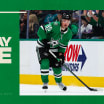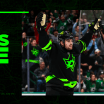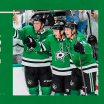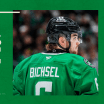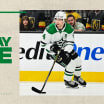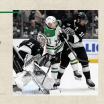TAMPA, Fla. --There is a kind of 'boy-meets-world' -- or rather 'hockey-world-meets-boy' -- element to what is happening with Dallas Stars defenseman John Klingberg these days.
And the temptation -- the easy way, really -- is to suggest this season, which has included an invite to his first-ever NHL All-Star Weekend, is a kind of coming out party for the league's leading point-producing defenseman.
Making his case: Klingberg building legitimate Norris argument
The All-Star defenseman continues to produce at a league-best level -- and the hockey world is taking notice
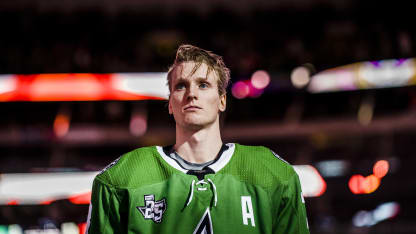
But even amid unprecedented discussion about his place in the Norris Trophy discussion, a midseason vote by the Professional Hockey Writers' Association -- whose members vote on major awards, including the Norris -- had Klingberg third. It would do a disservice to Klingberg to suggest that this has suddenly justhappened, as though he'd been touched by some magic wand that has allowed him to become visible to the rest of the hockey world.
It didn't happen that way.
No. In fact, his journey to edge of the bright light of stardom has been marked by struggles and setbacks, and a lot of introspection.
Sitting near the pool amid the pastoral settings of the players' hotel during All-Star Weekend, Klingberg is asked about his evolution over the past year. He politely suggests to understand is to go further -- in fact, all the way back to his final year in Sweden and a conversation with Dallas general manager Jim Nill.
At the time, Nill, newly installed in his position in the summer of 2013, had wanted Klingberg to come to North America and get some seasoning in the American Hockey League. Klingberg had another idea. He'd come off a disappointing turn playing in Finland and wanted to prove himself at home before making the big jump to North America.
It was not an easy conversation to have for a young man whose English was still developing and who was, at best, a project having been selected 131st overall in 2010.
"They really wanted me to come over and play in the minors and it was tough for me to say 'no' because it's never easy to talk to a GM, Jim Nill," Klingberg recalled. "And there was like three or four scouts around me, and I didn't talk very good English, and I was nervous about that meeting, but I had to take pride and take responsibility for my own career."
"I felt that I wasn't ready. I struggled a lot in Finland. And I really wanted to be one of the best players in the Swedish league before I left home and was 100 percent sure that I actually could make the NHL right away, even if I knew I had to go to the minors (first)."
For fans of the Stars, the Klingberg arc after that meeting is well-known.
Klingberg played the 2013-14 season in Frolunda and then made the transition to the American Hockey League. Called up from Texas of the AHL in 2014-15, he raised eyebrows with 40 points in 65 games for the Stars. The following year, the Stars won the Central Division and Klingberg was, again, an offensive catalyst for the high-flying group with 58 points in 76 games -- fifth among all NHL defenders.
Last season was -- as it was for most, if not all, of his teammates -- a disappointing year for the well-spoken native of Goteborg, Sweden.
It was a season that reminded him, in spite of his high-end offensive skill set, he was not yet where he needed, or wanted, to be in becoming a complete NHL defenseman. There were too many wild swings in his game and he found himself making the same kinds of mistakes that he thought he had identified and corrected earlier in his career.
"I learned a lot about myself," Klingberg said. "I struggled with the same kind of things in the area of the game I struggled with a lot before, too. And I thought that this is not going to happen again, that I learned this three or four times before in my career. But actually, the same kind of things happened again and I think that was really big for me individually. I learned a lot about myself, personally."
Cue the arrival of Ken Hitchcock and defensive specialist Rick Wilson.
The adjustments made to Klingberg's game were subtle but pivotal.
Klingberg describes playing an "easier" game, which might also translate as 'smarter.' Wilson has a phrase: work really hard to keep it simple. It implies what everyone knows -- that being an elite NHL defenseman is not just about possessing world-class skill, but applying it in the most intelligent way possible.
Klingberg is doing that, leading the Stars in average ice time per game and leading all defenders in points.
It has become almost second nature to him.
"It all sits in my back bones now. It feels like it's just coming naturally," he said. "That's the thing, too -- fourth year here now, I know how the league works. I know how to prepare for games. It's 82 games -- it's a lot of games, but I really found a routine that works for myself; how I have to be prepared for every game."
Who is noticing? Just about everyone.
And it's created an interesting narrative vis-a-vis where Klingberg deserves to be in the discussion about the Norris Trophy as the game's top defenseman.
As a longtime voter -- and, for three years, the president of the PHWA -- responsible for compiling a comprehensive list of voters for the major awards, including the Norris, we must admit we haven't always been comfortable with the selection of Norris Trophy winners.
For instance, though there were worthier candidates, P.K. Subban won in 2013 after the lockout because he spent 60:54 in total killing penalties in 42 games -- ninth on the Montreal Canadiens -- which is not a slight against the fluid, gifted Subban. Likewise when Erik Karlsson won his first Norris in 2012, we thought there were more complete defenders in the field, and conversely thought Karlsson deserved it more than ever last year because of his all-around game, but the award went to Brent Burns.
Mike Johnson is a former NHLer who has established himself as one of the top analysts in the game. For him, the Norris Trophy winner is someone who's hard to play against. "You can be hard to play against in a lot of different ways," Johnson said. That means potentially being hard to play against because of your offensive prowess.
"An ideal Norris Trophy winner is, if you're down a goal, you want him on the ice, and if you're up a goal, you also want him on the ice," he said. "That would be an ideal candidate to me -- a guy who could do it at both ends well and probably great in one area or another."
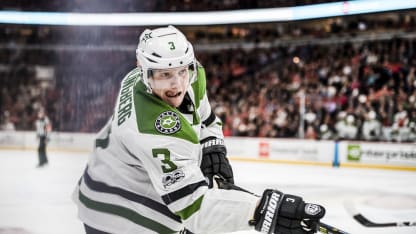
© Sean Berry/DallasStars.com
Klingberg? He's part of that discussion because of his offense, Johnson said.
"The strength of that area carries him into the conversation," he said.
For Washington head coach Barry Trotz, the qualities of a Norris Trophy-worthy defender are similar to those outlined by Johnson.
"I think it's someone he plays against top players, plays all situations, can contribute offensively and defensively," Trotz told DallasStars.com. The game has changed, though, so that teams attack with defensemen to give them numbers in the offensive zone. Those players have to know when to go, when to stay so that has altered the role and, therefore, the assessment of how to identify a top defenseman.
"I think when you get guys like a John Klingberg and John Carlson, to me, are similar players that are sort of the under the radar," Trotz added. "They've been really good offensive players for a few years and now their defensive game has come around. And I know in both Johns, actually, they have now evolved to be a top-pairing defenseman. They're playing against top guys. They're playing late in the games."
Sometimes, people will look at players like Carlson and Klingberg -- and before them, Karlsson -- and see them as they were when they were younger, perhaps more reckless and prone to mistakes. It's hard for them to reconcile the subtle changes they've made to their games.
"I think Klingberg and Karlsson are both in that area where they're jumping to the next level," Trotz said. "And every coach in the league sees it. And everybody who's around these guys on a daily basis see it. It's just getting your casual fan (and) some of the different media outlets to recognize that these players have evolved to be top guys."
We caught up with Alex Pietrangelo during All-Star Weekend, as well. Funny how small the hockey world is. Klingberg was looking to pick the top St. Louis Blues defender's brain about playing for Hitchcock as teammates on the Central Division squad.
And Pietrangelo's name comes up when Hitchcock and Wilson talk about being an emerging young defender in the NHL with Klingberg.
Pietrangelo laughed when he heard that he is spoken of in conversation in Dallas.
"Oh, Hitch, how nice of him," he chuckled. "I'm going to have to call him and thank him."
Pietrangelo is a good example, though, of the ascendency of an elite defenseman. He is having a Norris-worthy season, although he admitted he's glad he doesn't have to do the voting, given the number of players who deserve consideration.
"If you're going to be the best defenseman, I think the best two-way game, I think, goes a long way," he said.
As for Klingberg and Dallas, Pietrangelo said he'll take it as a compliment that Hitchcock uses him as a kind of template, and was quick to praise Klingberg.
"He's having one heck of a year. He's doing a heck of a job," Pietrangelo said. "Hitch is lucky to have him."
So, now what?
Over the course of 48 hours or so at All-Star in Tampa, Klingberg answered more questions about himself -- his prowess and his place in the discussion of the game's best defensemen -- than he had answered in his entire career.
He answered with eloquence and humility, but with the confidence of someone who isn't intimidated by such talk.
"You can tell because I feel like I've done a lot of media lately, like the last month or so, so it's a lot of fun because you can tell that you've done something good," he said. "A lot of guys want to talk to you and I take pride in that for sure, and it's always a good thing to be recognized in media."
At one point, Klingberg turned to teammate, and fellow All-Star, Tyler Seguin and said, "holy (smokes), this is a lot of media."
"And he said, yeah, it is, but wait 'til we play a Stanley Cup final," Klingberg said. "That's crazy."
And there's the rub, no?
Having people ask you about being a Norris Trophy defenseman is nice. It's important. But it's something that needs to be kept very much in perspective, especially for a team that dreams the big dreams of a long playoff run -- of a second championship for the City of Dallas.
Klingberg said he feels his profile has changed.
"I feel like I still have a ways to go because I want to be a player that the coaches can trust in every situation," he said. "I feel that they can do that now, but we have such a good kind of role system right now on our team, and it's working. We shouldn't change that, even if I can play (the penalty kill) and I know I can do that."
As much as the coaching staff will give him, whether it's more responsibility against top players or more penalty-kill time, Klingberg is eager to take.
"I want to take that step, but it takes hard work from me," he said. "And that gives me more motivation to do that as well."
This story was not subject to approval of the National Hockey League or Dallas Stars Hockey Club. You can follow Scott on Twitter at @OvertimeScottB, and listen to his Burnside Chats podcast here.


